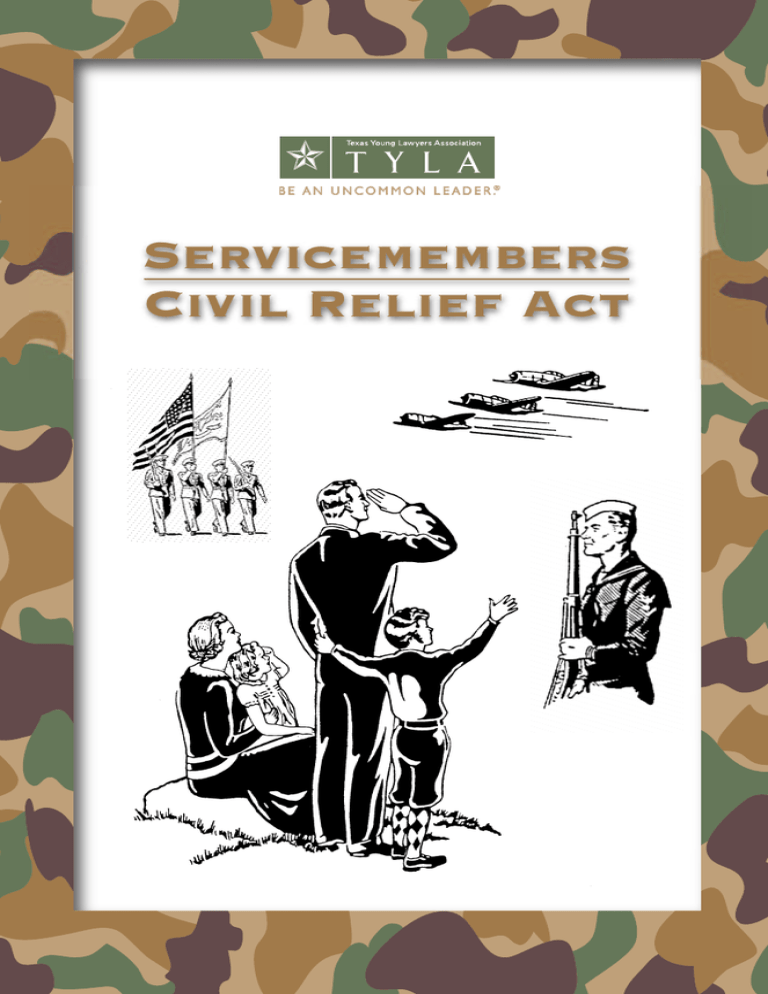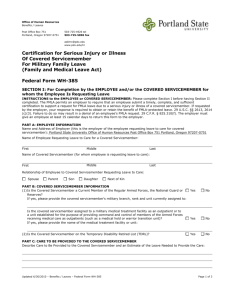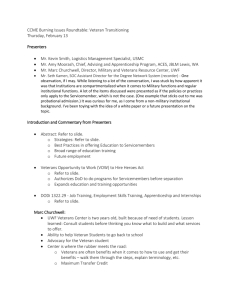
Servicemembers
Civil Relief Act
Texas Young Lawyers Association Military Affairs Committee
Co-Chairs
Daniel Peugh and Heath Poole
Vice-Chairs
Adrienne M. Clements
Jeffrey S. Edwards
Jaime S. Rangel
Executive Committee
William W. Miller, Jr., President
Mary E. Reveles, Chair
Cori Harbour, Vice President
Jennifer Evans Morris, Secretary
Chad P. Ellis, Treasurer
Sylvia A. Cardona, President Elect
Clay B. Scheitzach, Chair-Elect
Karin Crump, Immediate Past President
Please note that this Guide is solely intended to provide general information only and is not a
substitute for legal counsel. The laws outlined in the Guide are subject to change at any time.
If you have a specific legal problem, we suggest that you consult an attorney.
Copyright 2007
TEXAS YOUNG LAWYERS ASSOCIATION
Curriculum materials created by the Texas Young Lawyers Association. All rights
reserved. No part of these materials may be reproduced in any form or for any other purpose
without the written consent of the Texas Young Lawyers Association.
1
Servicemembers Civil Relief Act
America has had special laws protecting servicemembers dating
back to the Civil War. Such laws have protected the legal rights of
members of the armed services who cannot sue or defend a lawsuit
while they are on active duty. Interpreting one such law in,
Lemaistre v. Leffers, 33 U.S. 1 (1948), the United States Supreme
Court has said that these laws are meant to benefit, “those who
dropped their affairs to answer their country’s call.” It is in that
spirit in 2003 that the United States Congress passed 50 U.S.C.
App. 501, The Servicemembers Civil Relief Act (“SCRA”).
Who is Covered by the Servicemembers Civil Relief Act?
1. Members of the Armed Services.
2. Members of the Armed Services Reserves who are on active duty.
3. Members of the National Guard if they are activated under a federal
call to active duty. It also applies when Guardsmen are activated
more than thirty days in response to a president’s declaration of a
national emergency.
4. Many portions of the SCRA apply to the dependents of servicemembers.
The SCRA Helps with Residential Leases
1. A servicemember and his or her dependents may not be evicted from
a residence for which the monthly rent does not exceed $2,400
during a period of military service except by court order. The
amount of rent can be higher if adjusted for inflation. The figure in
2006 was $2615.16.
2. A landlord also may not subject the servicemember’s residence to a
distress during a period of military service.
3. A court may on its own motion, but must on a motion made by a
servicemember, stay eviction or distress proceedings for a period of
90 days, or adjust the obligation under the lease to preserve the
interests of all parties.
4. A servicemember may, at his or her option, terminate a
residential lease any time after the lessee enters into military
service. Leases that may be terminated include leases for
premises occupied by the servicemember or a servicemember’s
dependents and leases entered into by a servicemember for
professional, business, or agricultural purposes.
2
The SCRA Helps with Mortgages
1. Servicemembers can receive a stay of
foreclosure proceedings during periods
of active duty or within 90 days of return
from active duty.
2. A court may adjust the amount of
mortgage payments and the maturity
dates of mortgages to preserve the
interests of the servicemember and his
or her dependents during a period of
active duty.
3. These protections apply to an obligation on real or personal property
that a servicemember is still paying for and that the servicemember
acquired prior to going into military service.
4. To be granted this relief a court must find that a servicemember’s
ability to meet his or her financial obligation as to the property is
materially affected by military service.
The SCRA Helps with Automobile Leases
and Credit Purchases
1. When a servicemember has been on active duty for 180 days, he or
she may terminate an automobile lease agreement.
2. Servicemembers may also terminate automobile leases if they have
received permanent change of station orders moving them outside
the continental United States. Other scenarios involving permanent
change of station orders can also trigger the protections of the SCRA
as they affect automobile leases.
3. Interest bearing debt acquired before a servicemember goes into
military service can have the interest rate capped at 6% on the
servicemembers notice to creditors.
4. The intent of this part of the SCRA is to lower the debt payments for
servicemembers while they are on active duty.
5. Interest in excess of 6% that would have been charged is completely
forgiven. It cannot be collected after the period of military service,
and it cannot be collected under any other name or theory.
6. In addition, a creditor may not accelerate the due date of payments
in response to a request for the 6% interest cap.
3
The SCRA Helps with Health Insurance
1. Servicemembers are entitled to have their health insurance policies
fully reinstated after they return from a period of active duty.
2. The reinstatement is to be immediate and without exclusions for
conditions that arose before or during the period of military service
as long as the condition would not have entailed an exclusion or
waiting period had the servicemember remained covered and if the
condition has not been determined by the Secretary of Veteran’s
Affairs to be a disability incurred or aggravated in the line of duty.
3. Servicemembers must apply for the reinstatement of their health
insurance policy within 120 days after they are released from
military service.
The SCRA Helps with Voting Rights
1. For the purposes of voting in any federal, state, or local election, a
person who is absent from a State in compliance with military orders
shall not, merely by reason of that absence be deemed to have lost
residence or domicile in that State. This is true without regard to
the servicemember’s intent to return or not return to that State.
2. Further a servicemember absent on orders will not be deemed to
have gained residence or domicile in any State for voting purposes.
3. It is the purpose of this provision to allow active servicemembers to
vote in their home state elections regardless of their absence from
the jurisdiction due to military duty.
The SCRA Helps with Civil Lawsuits
1. A servicemember’s deadline
to bring a lawsuit can be
extended by not counting
periods of active military service
when computing a Statute of
Limitations period.
2. A servicemember’s deadline to
redeem real property can be
extended by not counting
periods of active military
service when computing the
redemption deadline.
3. Servicemembers who have
been sued but have made no
appearance in the lawsuit (usually due to the servicemember
not being properly served with
4
5.
6.
7.
8.
9.
10.
11.
12.
13.
the lawsuit while deployed) have protections
from the court though they are absent.
4. One such protection is the requirement on the
opposing party to file an affidavit stating either
that the person being sued is not on
active military duty or that the party could not
determine whether or not the person being sued is engaged in military service before a judgment can be granted. There are penalties
for filing false affidavits in these matters.
Further, the court in a lawsuit against a servicemember who has
made no appearance can order an attorney to be appointed to defend
a litigant that is found to be in military service. A court or administrative body may not enter judgment (also known as default
judgment) against a defendent on active duty until it has appointed
an attorney to represent the servicemember.
An appointed attorney may request a 90 day stay of proceedings if
there may be a defense to the civil action and the defense cannot be
presented without the servicemember attending court or if counsel
cannot contact the defendent.
For servicemembers who are in a period of military service or within
90 days of a period of military service, and have received notice of a
lawsuit against them, a stay of proceedings is available.
A court can on its own motion grant a stay of proceedings of not
less than 90 days when a servicemember has notice of a suit but is
in a period of military service.
The court must grant a stay of not less than 90 days when a
servicemember requests it. The request must: 1) communicate to the
court that military service materially affects the defendent’s ability
to participate in the case, 2) provide the court with a date that the
servicemember can appear in court, 3) and include a letter from a
commanding officer indicating that the defendent’s military duty
prevents him or her from appearing in court and that a leave of
absence will not be available.
A servicemember may request and receive additional stays if the
court deems it appropriate and can even receive a stay from having
to comply with an order or decree that may have been entered.
Judgments entered during a period of military service or within
60 days after military service can be set aside.
A servicemember must make an application with the court within 90
days of release from military in order to have such a judgment set aside.
The application must show that the servicemember was materially
affected in his or her handling of the suit by military service. The
application must also show that the servicemember has a meritorious
defense to all or part of the lawsuit.
5
The SCRA Helps with Taxes
1. Servicemembers, as a general proposition, are not to be
taxed both by their state of residence and by the state
they are stationed in. To that end, a servicemember will
not acquire or lose residency for tax purposes by virtue
of being at an active duty station.
2. Military pay is not income for purposes of taxation at an active duty
station if the servicemember is not normally a resident of the state
he or she is stationed in.
3. Servicemember’s personal property is not subject to taxation at their
active duty station if the personal property is not normally located
in the state he or she is stationed in.
4. The spouse of a servicemember who has gone to a duty station with
the servicemember can have his or her income and personal property
taxed by the state they have moved to.
5. However, the servicemember’s income cannot be added to the accompanying spouse’s income when calculating the spouse’s tax burden.
6. Servicemembers will have to pay sales and use taxes in the states of
their service.
7. Only a servicemember’s home state can collect Ad Valorem taxes
from a servicemember.
8. Property taxes can be collected by the state in which the servicemember’s real property is located whether that be the home state or
the duty state.
9. Servicemembers will only have to pay license and registration for
automobiles in one state. That can be either the duty state or the
home state but not both.
10. Host states can require servicemembers to obtain local driver’s
licenses even at the servicemember’s expense.
11. Payment of income taxes can be deferred up to 180 days after the
termination of military service if, the servicemember’s ability to pay
was materially affected by military service and the servicemember
has given notice to the IRS, state, or local taxing authority.
12. No interest or penalties will accrue on unpaid taxes during the
period of deferral.
13. The Statute of Limitations for collecting taxes from a servicemember
is tolled during the period of military service and through 270 days
after service.
14. Servicemembers must still file tax returns even when benefiting from
these provisions.
15. If taxes become due on a servicemember’s personal property before
or during the servicemember’s entry into military service and said
taxes remain unpaid, the personal property cannot be sold to pay
6
16.
17.
18.
19.
20.
21.
the taxes without a court order. To issue such an order the court
must find that the military service did not materially affect the
servicemember’s ability to pay the unpaid tax.
The court may also stay collections proceedings during the period
of military service and up to 180 days after military service.
If property is sold to collect taxes during a period of military service
the servicemember has the period of service and 180 days after
military service ends to initiate an action to get the property back.
Interest that accrues on unpaid taxes or assessments is limited to 6%.
If taxes come due on real property, that is used for a dwelling,
professionally, for a business, or agriculturally, before or during the
period of military service and the taxes remain unpaid, the property
cannot be sold to pay the taxes without a court order. To issue such
an order the court must find that the military service did not
materially affect the servicemember’s ability to pay the unpaid tax.
The court may also stay collections proceedings involving real
property during the period of military service and up to 180 days
after military service.
If real property is sold to collect taxes during a period of military
service the servicemember has the period of service and 180 days
after military service ends to initiate a redemption action to get the
property back.
7
Who You Can Contact
Armed Forces Legal Assistance
http://legalassistance.law.af.mil/
American Bar Association
http://www.abanet.org/legalservices/lamp/
1.800.285.2221
The Full Text of The SCRA
http://www.uscg.mil/Legal/la/topics/sscra/sscra_guide.htm
Bryan S. Spencer
Colonel, JAGC, USA, Ret.
Director, Operation Enduring LAMP
State Bar of Texas
P.O. Box 12487
Austin, TX 78711-2487
1.800.204.2222 ext. 2155
8
Prepared as a Public Service by the
Texas Young Lawyers Association
and Distributed by the State Bar of Texas
For Additional Copies Please Contact:
Public Information Department
State Bar of Texas
P.O. Box 12487
Austin, Texas 78711-2487
(800) 204-2222, Ext. 1800
www.tyla.org
36562 10/08

![(NPD-60) []](http://s3.studylib.net/store/data/007320126_1-47edb89d349f9ff8a65b0041b44e01a8-300x300.png)



